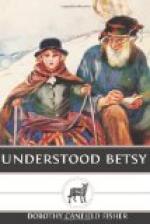“You bet!” he assented. “But Hillsboro is the next station and that’s at the top of the hill. We go down after that to Rutland.” He turned to Elizabeth Ann—“Say, little girl, didn’t your uncle say you were to get off at Hillsboro? You’d better be getting your things together.”
Poor Elizabeth Ann’s knees knocked against each other with fear of the strange faces she was to encounter, and when the conductor came to help her get off, he had to carry the white, trembling child as well as her satchel. But there was only one strange face there,—not another soul in sight at the little wooden station. A grim-faced old man in a fur cap and heavy coat stood by a lumber wagon.
“This is her, Mr. Putney,” said the conductor, touching his cap, and went back to the train, which went away shrieking for a nearby crossing and setting the echoes ringing from one mountain to another.
There was Elizabeth Ann alone with her much-feared Great-uncle Henry. He nodded to her, and drew out from the bottom of the wagon a warm, large cape, which he slipped over her shoulders. “The women folks were afraid you’d git cold drivin’,” he explained. He then lifted her high to the seat, tossed her satchel into the wagon, climbed up himself, and clucked to his horses. Elizabeth Ann had always before thought it an essential part of railway journeys to be much kissed at the end and asked a great many times how you had “stood the trip.”
She sat very still on the high lumber seat, feeling very forlorn and neglected. Her feet dangled high above the floor of the wagon. She felt herself to be in the most dangerous place she had ever dreamed of in her worst dreams. Oh, why wasn’t Aunt Frances there to take care of her! It was just like one of her bad dreams—yes, it was horrible! She would fall, she would roll under the wheels and be crushed to ... She looked up at Uncle Henry with the wild, strained eyes of nervous terror which always brought Aunt Frances to her in a rush to “hear all about it,” to sympathize, to reassure.
Uncle Henry looked down at her soberly, his hard, weather-beaten old face quite unmoved. “Here, you drive, will you, for a piece?” he said briefly, putting the reins into her hands, hooking his spectacles over his ears, and drawing out a stubby pencil and a bit of paper. “I’ve got some figgering to do. You pull on the left-hand rein to make ’em go to the left and t’other way for t’other way, though ’tain’t likely we’ll meet any teams.”
Elizabeth Ann had been so near one of her wild screams of terror that now, in spite of her instant absorbed interest in the reins, she gave a queer little yelp. She was all ready with the explanation, her conversations with Aunt Frances having made her very fluent in explanations of her own emotions. She would tell Uncle Henry about how scared she had been, and how she had just been about to scream and couldn’t keep back that one little ... But Uncle Henry seemed not to have heard her little howl, or, if he had, didn’t think it worth conversation, for he ... oh, the horses were certainly going to one side! She hastily decided which was her right hand (she had never been forced to know it so quickly before) and pulled furiously on that rein. The horses turned their hanging heads a little, and, miraculously, there they were in the middle of the road again.




